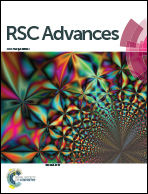Facile modification of ZIF-8 mixed matrix membrane for CO2/CH4 separation: synthesis and preparation†
Abstract
Metal–organic frameworks (MOFs) possess tunable characteristics that allow various modifications to be practiced and suitability for specific applications. In this study, zeolitic imidazole framework 8 (ZIF-8) was synthesized and subjected to ammonia modification under different temperatures and ammonia solution loading. The presence of the N–H group observed after the modification indicates the successful modification of ZIF-8. The modified ZIF-8 showed notable changes with increased phase crystallinity, micropore volume and BET surface area. The unmodified and modified ZIF-8s were then dispersed into a polysulfone (PSf) matrix, and the MMMs were prepared via dry/wet phase inversion. No apparent differences in the membrane’s morphology and thermal stability were noticed between the neat PSf membrane and the MMMs. The MMMs were further subjected to pure CO2 and CH4 gas permeation experiments. CO2 permeance decreased while CO2/CH4 selectivity increased as a result of ZIF-8 modification, due to the decrease in mesopore contribution and the increase in micropore contribution to the gas permeation path. The affinity of the N–H group in the modified ZIF-8 to CO2 also contributed to the increase of CO2 permeance. For example, when the ZIF-8 modified in 25 mL ammonia solution at 60 °C (Z25c) was dispersed in the PSf matrix, the CO2/CH4 selectivity increased to 72% and CO2 permeability to 43% compared to the neat PSf membrane.


 Please wait while we load your content...
Please wait while we load your content...